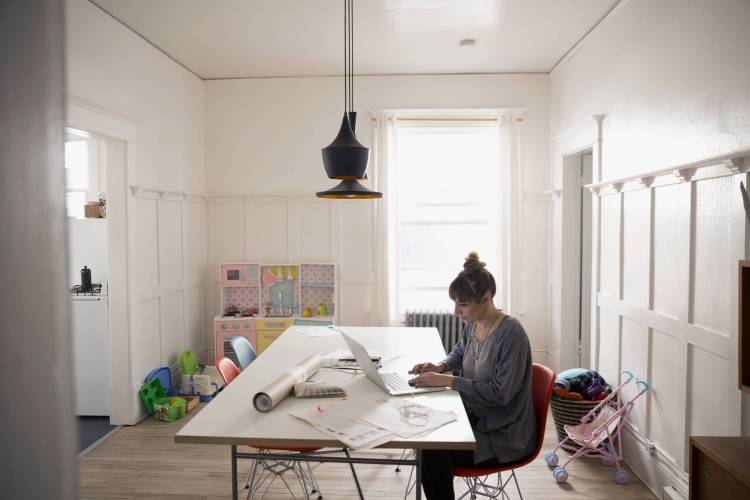We all have a couple of creative skills under our belts, from writing to drawing, to crafting posts for social media or making and editing videos. All in all, we’re all capable of something that takes a bit of effort and a lot of imagination!
And some of us can begin to wonder, ‘What if I could take this hobby to the next level?’. What if you could really make a career out of what you love to do in your spare time? If you believe in your skills enough, and you know how to build up a portfolio that people will really take notice of, you’ve got a great chance to do just that!
Whether you want to get a job as part of a bigger company, or you’re looking to go freelance and make all of the decisions yourself, the creative skill you hold dear has a place in the professional world. You just need to know your own strengths and weaknesses surrounding it, and then learn to sell yourself.
So, without further ado, let’s go through some of the best ways to hone your creative skills into something a little more professionally minded. After all, you could make some very good money here, and it’s about time you knew how to!
How Long Have You Had Your Hobby?

How freelancing can help your career
When considering if you’re ready to turn a particular creative hobby into a career, it’s important to note just how long you’ve been at it. For example, if you’re new to writing, and you’ve only been dabbling in turning out fictional stories for a couple of months, there’s a very good chance you’re going to need a bit more practice before a publisher will pick up your work!
So, if you’re trying to make a career out of a hobby you’re acing at, it’s key to have a bit of experience under your belt. If you’ve been drawing every day for the past 10 years, get some of your old drawings out and compare them to new ones – the progression between the two periods should be very clear!
Because when you can see a clear difference like that, you’re on the right path. You know you’ve come from barely anything with your skill, and you’ve turned it into something that looks polished and refined, and like a lot of time, care, and effort has gone into it. With this knowledge, and clear evidence under your belt, you’re going to have a much easier time of putting your work out there and getting it noticed.
Be Aware of When Blocks May Occur

4 reasons my freelance career is more secure than your full-time job
Creative blocks happen to us all. We go through dry periods where nothing comes out of a pen or pencil, or out of our knitting needles or keyboards, and we just can’t force even a line onto the paper in front of us. We feel like we’re stuck, and are out of ideas, and we have no idea when the next one is going to strike!
And when you’re trying to make a career out of a creative skill, you need to be aware of when blocks like these are going to occur. Because when you’re painting or writing or recording or crocheting for a living, you need to keep the pieces coming, and you can’t just stop or slow down when there’s a demand from your customer or viewer base!
So, what makes you go into a creative slump at the moment? Is it during stressful periods? Is it when you’re tired? Is it at a certain time of the year? If you’re aware of when you’re likely to crash into a block, you’re going to be much better at navigating your block, and keeping your art coming.
It’s also good to know some block busting exercises that’ll get the creative juices flowing again. Use word prompts for your drawings and stories, look up what other people are doing on the video hosting platform you’re on, and think about nabbing a few ideas and putting your own spin on them. Simply put, go out there and look for inspiration, and make notes about as many things as possible.
Get Your Hands on Some Essential Tech
How to Turn Your Hobby Into Your Job (Without Losing Your Passion)
Technology is a big part of taking your favorite hobby to the next level, seeing as we live in a modern age with a lot of digital capability at our fingertips. And seeing as most people reach out for a career across the internet, which is digitally based and requires a good bit of software to keep up with, you’re going to have to invest some time and money here.
And there’s a lot of tech out there; someone who is interested in coding is going to have at least a high end computer at the ready, and there’s so many upgrades this one bit of kit can go through to improve performance. Technology is always changing, and keeping up with this is going to ensure you’re always at the top of your game.
If you’re an artist, make sure you know how to use a drawing tablet. Make sure you know which digital software suits you the most, and watch as many tutorials as possible – most of them are free, and can be found on Youtube. All you need is the time and patience to work through them, to gain some knowledge, and ensure you can use modern art tech to the best of your ability.
If you’re a photographer, and you love to seek out scenes and capture them in the most magical of ways, make sure your camera is the best model you can get your hands on. Know the features you’re most in need of, and know what you work best with – even something like a DJI Osmo Pocket, which can fit comfortably into the palm of your hands, is amazing for taking pictures on the go.
Get as Much Feedback as Possible
Feedback is key when you’re trying to hone a creative skill; if you don’t know what people think of what you do, how are you ever going to improve? And more importantly, how are you going to appeal to the people you really want to start selling towards?
So, start at home. Ask your friends and family for both positives and negatives about the creative piece you’ve put in front of them; most of your immediate network are going to be uneducated in your skill, after all, and it’s nice to have a more general and unbiased opinion to work with.
But then think about taking to artistic platforms; most forms of social media will work for this, but you can even try to reach out in more of a serious networking manner too. When you post, be sure to ask for constructive feedback you can put to good use. Follow people who are in the same niche as you, reach out and comment on their work, and even ask for them to check you out too. More often than not they’ll do so without asking, but it never hurts just to check!
Of course, you should never rely on your follower count, especially when you’re a smaller creative. But it’s a good indicator of how well received you currently are, and whether or not you may need to step up your networking, or how often you post.
And Take it Slow
From yoga instructors to novelists: five ways to turn your hobby into a job
And finally, make sure you take it slow during a time like this. You want to hone your skills, and polish them off, rather than rush yourself and end up in a unhelpful place, much more than you were originally.
You want to take it slow because you have the time and energy to: you need to pace yourself, and ensure you don’t get too excited over this new venture, and then get bored or disillusioned by it in a couple months time.
Be sure to give yourself some breaks on your journey too. Have a routine that helps you to spin out some creative things, and ensures you don’t neglect yourself on this pursuit either. You don’t want to be stuck at a desk all day, that only helps you to feel down and out about yourself.
And when you take it slow, it’s easy to backpedal if you make a mistake, or you’re second guessing a decision. You won’t be rushing out pictures of your latest project on Instagram, no matter how poor quality it is, and that matters when it comes to artist integrity and putting your fans first.
Your Creative Skill Could Be a Career By Next Year
How to Create Benchmarks When You Work for Yourself
No matter how you feel about your creativity, you’ll always have the chance to build on it. And as long as you look out for opportunities, and keep the tips above in mind on your journey, you’ll go far. Start out as a side hustle, and then slowly work your way towards more mainstream revenue. If you love what you do, you’ll never lose passion for it!